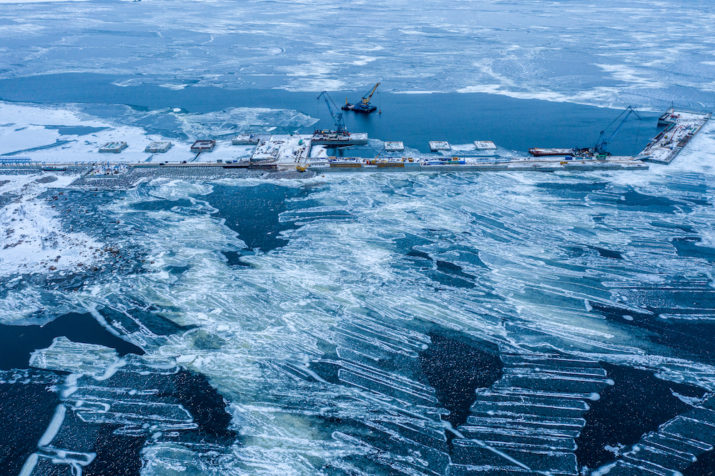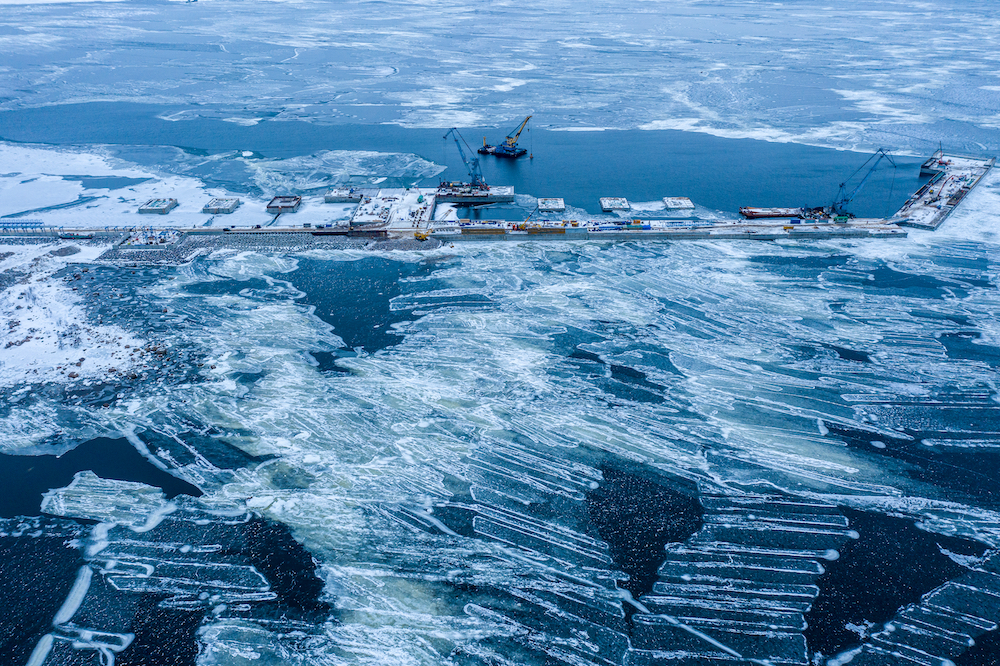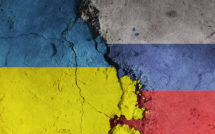

This is part of a series on the Ukraine Crisis.
German Chancellor Olaf Scholz has wavered recently on the question of Nord Stream 2, the controversial Baltic gas pipeline project connecting the Russian terminal at Ust-Luga to the German port in Lubmin and, from there, Western Europe. As late as December, he shot down any connection between the pipeline and the situation in Ukraine:
Nord Stream 2 is a private business project. It has been advancing to such an extent that the pipeline has been put in place and it is just a partial issue that needs clarification that has to do with the unbundling of the enshrined in European legislation…. But it is a question that is different from another question that we touched upon earlier, and that is that we talk about what we can do to ensure that we will never find ourselves in a situation where the integrity of Ukraine is violated.[1]
More recently, however, his rhetoric has shifted from defiant dismissal to a tentative embrace of the relationship between Moscow’s anticipated attack on Ukraine and its hopes for an enlarged presence in western European gas markets. In response to a question about his current position on whether he would consider blocking the Nord Stream 2 project were Russia to invade Ukraine, Scholz recently stated, “It is clear that there will be a high cost and that all this will have to be discussed if there is a military intervention against Ukraine.”[2] More recently, however, he seemed to backtrack again. After their February 7 meeting, United States (US) President Joe Biden repeated his administration’s policy that, in the event of invasion “there will no longer be a Nord Stream 2.” Scholz, however, met such direct statements with the noncommittal assertion that the US and Germany are “absolutely united.” Details or direct mention of the pipeline did not follow.[3]
Taken with his own tentative openness to discussing Nord Stream 2 in the context of possible and increasingly likely Russian aggression, and with Foreign Minister Annalena Baerbock’s linkage of the two issues last year,[4] Scholz’s recent equivocations might actually indicate acquiescence to if not a full embrace of Biden’s policy. Even if this is the case, however, Scholz himself has still only gone so far as to accept discussion of whether the pipeline will be discussed as a potential retaliatory mechanism, rather than how to deploy it as such if the situation arises. He is scheduled to visit Moscow and Kiev this week. These trips come on the heels of an unsuccessful visit by French President Emmanuel Macron to Russia just a few days ago, and a meeting between the Baerbock and Ukrainian President Volodymyr Zelensky that had reportedly been delayed in part because Baerbock could no longer commit to sacrificing the pipeline.[5] At this point, Scholz needs to decide, or declare, where he actually stands on the issue, so long as the pipeline project still has deterrent rather than just retaliatory potential.
If Russia does invade eastern Ukraine, it would not be the first time that Russia has violated Ukrainian sovereignty. In 2014, it annexed Crimea to international, European Union (EU), and German condemnation. Retaliatory sanctions from the US and EU have been substantial, consisting of targeted travel restrictions and asset freezes, an embargo on the breakoff states of Crimea and Sevastopol, restrictions on Russian bank access to European capital markets, and a ban on weapons imports and exports.[6] Although these measures have squeezed the Russian economy by an estimated $50 billion in economic growth potential,[7] they have done little to curb Russia’s designs for Ukraine.[8]The deployment of an estimated 130,000 Russian soldiers to the Ukrainian border and thousands more into Belarus looks to be even more threatening than the earlier incursions. Russia’s recent intervention against protestors in Kazakhstan, moreover, has confirmed that Russia is willing to use force with minimal provocation when its geopolitical interests are threatened. What is more, according to the head of the Ukrainian intelligence service General Kyrylo Budanov, the Ukrainian military is ill-equipped to fend off a Russian attack for very long:
They will hold up as long as there are bullets. They’ll be able to use what they have in their hands, but believe me without delivery of reserves, there’s not an army in the world that can hold out.[9]
Indeed, the threat and vulnerability are serious enough that Kiev has begun training civilians for a potential paramilitary insurgency in the event that the formal military resistance collapses.[10]
Everyone, from Biden (whom Scholz met to discuss these matters on February 7) and Secretary of State Anthony Blinken to erstwhile German Chancellor Angela Merkel and current Ukrainian Zelensky to Baerbock and Scholz, have decried the troop build-up and promised retaliation for any further violation of Ukrainian territorial sovereignty. Such retaliation could come in various forms, though those hitherto promised are underwhelming. Direct arms deliveries are one option, though the current government has declined Ukrainian pleas for these even as countries such as the US and United Kingdom have accepted similar requests. Instead, Berlin has promised field hospital equipment and training.[11] Ukraine has renewed its request for German defensive weapons, though, with German public opinion against such measures, it is unlikely the still fragile traffic light (Social Democrat, Green, Free Democrat) coalition will take an unpopular lead on this matter.[12] German Defense Minister Christine Lamprecht has cited Germany’s historic burden of Nazi aggression against Russia, the longstanding policy of withholding German-made armaments from conflict regions, and the Foreign Office’s emphasis on de-escalation rather than provocation as reasons for this policy.[13] One might also wonder about the optics of Russia, whose Soviet predecessors bear responsibility for the Holodomor in 1932-3, which killed 3.5 million Ukrainians largely through starvation and related disease, once again subjugating Ukraine to its regional designs. In addition, one might ask whether the historical burden is not just a question of German militarism seventy years ago, but of Ukraine’s defense against Russian militarism today. Still, the fact remains that Ukraine is not a formal NATO member and Germany is not obligated (nor willing) to get involved militarily. Although the Bundeswehr could involve itself via NATO, moreover, serious coordinated military retaliation via that organization also remains unlikely and any reprisals would more likely come in the form of economic and diplomatic penalties and a NATO realignment along its eastern border, rather than direct military confrontation beyond treaty borders.[14] Indeed, Scholz recently committed additional German troops to the Baltic to counter Russia’s aggressive posturing there, though such moves will likely have little impact on the Ukrainian issue.[15] For his part, Russian President Vladimir Putin is aware of the predicament Ukraine poses for the military pact and is intent on preventing Kiev from drifting further into NATO’s protective sphere. He has recently and vociferously sought declarations from the US and NATO to backtrack on their previous assurances that it intended to open membership to Ukraine and Georgia—the latter being another former Soviet republic that Russia seeks to hold in its orbit.[16] Further weighing on Russian calculations, Ukraine is already a priority partner for the EU—which has entitled it billions of euros of loans and grants and millions of euros in humanitarian assistance—and is on track to apply for full membership in the EU over the next few years.[17] Putin seeks to prevent Ukraine’s integration into this political and economic bloc, as well.
Neither Ukraine, Germany, nor any western European power is likely to repel a Russian invasion through military exercises. NATO simply does not have the charge to do so and will more likely mobilize along its own eastern flank than commit the necessary forces to the defense of a non-member state. In fact, just recently, US president Joe Biden has committed several thousand US troops to Eastern Europe to reassure NATO member states there of continued protection.[18] Even these actions, however, have done little to protect them. One cannot know at this point whether an invasion is actually imminent, though Moscow continues sending signals that one is though preemptively deflecting blame onto NATO and the US for somehow provoking a potential invasion through opposing it. US intelligence also maintains it has discovered Russian plans to stage a false flag operation as an excuse to attack Ukraine, though for now these plans seem to be several of many potential actions that include cyberattacks, continued harassment at the borders, clandestine support for pro-Russian opposition groups, and depriving the Ukraine of Russian gas.[19]Notably, the latter would be much easier were Nord Stream 2 to come onstream.
Determent and retaliation, however, are not the domains of military hard power alone, but also of soft power—the operative word here being power. Germany’s soft power potential lies in its close energy relations with Russia. These ties have come under scrutiny lately in large part because of the Nord Stream 2 pipeline, which has been completed but is not yet in operation. With an annual capacity of 55 billion cubic meters, the pipeline could double the quantity of natural gas flowing from Siberia to German ports via this northern route. Total annual imports in 2020 were 102 billion cubic meters, an estimated 40 percent of which came from Russia. Total consumption in the same year was upwards 89 billion.[20] I have written on these pages previously that the primary issue with this pipeline is not some newfound dependency on Russian energy sources, which already account for 50 percent of its natural gas supplies. Germany is simply not in a position to decouple from foreign sources of energy, nor would such a move necessarily be desirable. Energy dependencies such as that between Germany and Russia, after all, are hardly the “captivities” that some have labeled them.[21] This situation, in all its precariousness, reflects that. Rather, energy dependencies are more accurately interdependencies, systems of mutual dependency wherein parties share an interest in maintaining the complex of investments, contracts, and trade networks on which the relationship had been established. The other side to this shared interest in the maintenance of these ties—be they economic, financial, or political—is that interdependencies also lend each side leverage against the other. At times, leveraging can work relatively smoothly in negotiations over contracts and terms of trade. At times of heightened political tensions, however, these same links can turn into potent mechanisms of soft power.[22] It is telling that attention has recently garnered around Nord Stream 2, a project that the past two US administrations and various other international actors have sought to undermine. At least in the short-term, the conversation has shifted from warnings of overdependency and vulnerability to a more balanced discourse of the project, still in its inoperative stage, as a strategic linkage through which Berlin could exert profound pressure on Moscow.
The primary issue at hand is Ukrainian energy and economic vulnerability to Russian force. Even this point, self-evident as it may seem, however, is not actually so simple or unidirectional. Ukraine is indeed susceptible to Russian energy manipulation. Even so, Russia is vulnerable in its reliance on Ukraine as an export hub, as well. Russian interest in the new pipeline is not just an attempt to broaden its foothold in German and broader European natural gas networks. It is also an attempt to break its own energy interdependency with Ukraine, which currently serves as both consumer and transit point for Russian gas deliveries to Europe. The current row, moreover, comes only after Russia, on numerous occasions over the last decade, leveraged its position as an energy supplier by cutting gas deliveries to Ukraine. So far, these efforts have failed to push Kiev on the question of western orientation and have only weakened rather than severed Russian dependency on Ukrainian transmission networks. A fully functioning Nord Stream 2 would just weaken this dependency further and diminish Kiev’s ability to resist Moscow’s pull.
Clearly, abandoning the $11 billion Nord Stream 2, or even suspending it indefinitely, would hit the German energy sector hard and the resultant uncertainty would exacerbate energy prices that have already been running high this year, spiking again upon Baerbock’s association of the pipeline and Ukrainian questions.[23] The United States and Norway have recently increased energy exports to Germany and Qatar may join them to do the same.[24] This could help settle prices somewhat, but making up for a shortfall in Russian gas from these three sources alone would nevertheless be a heavy lift. Putin has been quick to capitalize on this situation, simultaneously arguing that increasing imports of Russian gas is critical to ending the price turbulence and contributing to that price spiraling through tightening Russia’s deliveries to Europe.[25] In his own display of soft power pressure, moreover, Putin has also called for Germany, through joint ventures such as that between the German Wintershall AG and the Russian Gazprom, to supply shortfall gas to Ukraine and other eastern European markets, whose energy supply issues have been exacerbated by decreasing flows directly from Siberia.[26] Furthermore, recent manipulations of flows through the international Yamal Pipeline, which carries gas from northern Siberia through Poland and Ukraine to Germany, speaks directly to Putin’s willingness to use Eastern Europe as an excuse to restrict gas exports ultimately destined for Germany.[27]
While Berlin hesitates, Moscow seems quite willing to conjoin geopolitics and economics, albeit under a thin veil of supposedly purely economic motivation. Still, Putin’s recent actions do not just reveal Russian confidence, but they also betray his priorities and vulnerabilities. At this point, for instance, none of these measures has affected the operations of Nord Stream 1, the Russian-German pipeline that already bypasses Eastern Europe. Putin is cautious to jeopardize these lines of transmission as they grant freer access to western European markets. The same logic applies to Nord Stream 2, a project that Putin desperately wants so Russia can abandon the pipelines running through countries such as Ukraine. It remains to be seen whether Moscow can maintain these cuts indefinitely or is willing or able to take more drastic steps that are likely to have a greater impact on German supplies. If its goal is to convince the Germans that the new pipeline will contribute to national and European energy security, Russia can only go so far in squeezing German markets through politicizing the old lines of natural gas transmission. Otherwise, it would undermine the energy security argument for bringing Nord Stream 2 onstream. Deploying energy as a political weapon too brazenly, moreover, could also complicate Russia’s efforts to grow its foothold in major European markets, which might no longer consider the country and Gazprom—the Russian gas giant—reliable suppliers. Indeed, recent Russian cutbacks in gas deliveries speak directly against the idea that additional lines of transmission would promote Germany’s energy security. Coupled with renewed fears that Russia might “turn off the gas tap”[28]—an event that admittedly has not yet occurred and would seriously compromise Russia’s already shaky economy and its energy future in Europe—continued flow reductions may ultimately sour the current administration on Russian gas and especially Nord Stream 2.
It is true that Berlin’s suspension of the pipeline over the Ukraine question would further strain already fraught political relations with Moscow. This would have implications that reach beyond the question of Eastern Europe. For example, it could complicate Germany’s Energiewende, or transition from hydrocarbon-derived energy to green sources, in which affordable natural gas is considered a critical bridging fuel. Although rising gas prices might promote the transition to clean energy based on domestic and neighboring renewable sources in the long-run, it would certainly complicate more immediate goals of phasing out coal from its energy mix over the next decade while decommissioning Germany’s three remaining nuclear plants. Potential disruptions such as these, however, are precisely why the pipeline is one of Germany’s ultimate soft power weapons. Putin is betting that Germany is already too invested in Nord Stream 2 to terminate it. It remains to be seen whether he is right.
The situation is highly tentative for all players involved. Because of the energy ties between Germany and Russia and Russia’s broader energy ambitions, moreover, its implications reach far beyond Ukraine. Therefore, close cooperation between the US, the EU, and NATO is essential to convince Moscow that aggression is simply not worth the price. Germany must play its part in this. A joint EU-US punitive sanctions regime and NATO’s continued rejection of Russia’s demands to repudiate its expansion into Eastern Europe—a process whose wisdom was and still is hotly debated—is one part. So far, the Scholz government seems on board with these measures, even if the question of Russian energy will likely prove contentious in any coordinated Euro-American response. Such policies, however, will lack bite if Nord Stream 2 is not part of them. Delaying or abandoning the pipeline project could prove decisive in curbing Moscow’s designs on eastern Ukraine, a country that admittedly is not part of NATO or the EU but openly seeks to be. Russia has already politicized gas flows not just to Ukraine but also to Germany and Western Europe. It is now time that Berlin makes clear that it, too, is willing to embrace this linkage and suspend the pipeline indefinitely.. If doing so does not deter an invasion, it would at least prove a heavy energy-economic and political price for Putin to pay.
Admittedly, leveraging Nord Stream 2 in such a manner would be a major action that would have repercussions for Germany as well as Russia, even if it were just a temporary delay. This, however, is precisely why large energy infrastructure projects such as this pipeline must be recognized as more than questions of business, economics, and energy. At critical times of geopolitical tension, the political underpinnings of international energy systems are laid bare. In the present case, the power balance within the energy interdependency is revealing itself to be quite different than many detractors had anticipated. That is why Nord Stream 2 could prove a potent weapon, if, that is, Scholz finally abandons the artificial dichotomies between economics and geopolitics and between German energy security and Ukrainian borders. Unless one wishes to surrender the question of national and European energy security to the geopolitical aspirations of Russia, Scholz needs to publicly embrace the pipeline as a retaliatory option.
Nicholas Ostrum received his PhD in History from Stony Brook University in 2017. He is currently a lecturer at Xavier University of Louisiana and has been a member of EuropeNow’s Research Editorial Committee since the journal’s inception. His research examines West German petrorelations with key petroleum producers of the emerging postcolonial world.
References
[1] Joint press conference by German Chancellor Olaf Scholz and French President Emmanuel Macron, December 16, 2021, https://video.consilium.europa.eu/event/en/25338?audio_language=or.
[2] Hans von der Burchard, “Scholz: Germany will discuss Nord Stream 2 penalties if Russia attacks Ukraine,” Politico, January 18, 2022, https://www.politico.eu/article/olaf-scholz-consequence-nord-stream-two-russia-attack-ukraine/.
[3] Katie Rogers, “Biden says a Russia-to-Germany pipeline would not go forward if Moscow invades Ukraine.,” The New York Times, February 7, 2022, https://www.nytimes.com/2022/02/07/us/politics/biden-olaf-scholz-russia.html?searchResultPosition=1.
[4] “No green light for Nord Stream pipeline if any Ukraine escalation: Germany,” France 24, December 12, 2021, https://www.france24.com/en/live-news/20211212-no-green-light-for-nord-stream-pipeline-if-any-ukraine-escalation-germany.
[5] Jeremy Herb, “German chancellor: NATO response will be unified if Russia invades Ukraine despite disconnect on gas pipeline,” CNN, February 7, 2022, https://www.cnn.com/europe/live-news/russia-ukraine-biden-scholz-news-02-07-22/index.html.
[6] “EU restrictive measures in response to the crisis in Ukraine,” European Council, https://www.consilium.europa.eu/en/policies/sanctions/ukraine-crisis/.
[7] Anders Åslund and Maria Snegovaya, “The impact of Western sanctions on Russia and how they can be made even more effective,” The Atlantic Council, May 3, 2021, https://www.atlanticcouncil.org/in-depth-research-reports/report/the-impact-of-western-sanctions-on-russia/#h-the-dominant-western-response-to-putin-s-aggression-was-sanctions.
[8] “Timeline-EU Restrictive Measures in Response to the Crisis in Ukraine,” Council of the European Union, https://www.consilium.europa.eu/en/policies/sanctions/ukraine-crisis/history-ukraine-crisis/.
[9] Quoted in: Michael Schwirtz, “Ukraine Commanders Say a Russian Invasion Would Overwhelm Them,” New York Times, December 9, 2021, https://www.nytimes.com/2021/12/09/world/europe/ukraine-military-russia-invasion.html.
[10] Andrew E. Kramer, “Training Civilians, Ukraine Nurtures a Resistance in Waiting,” New York Times, December 26, 2021, https://www.nytimes.com/2021/12/26/world/europe/ukraine-russia-civilian-training.html.
[11] William Noah Glucroft, “Germany rejects arms deliveries to Ukraine, but will send field hospital,” Deutsche Welle, January 19, 2022, https://www.dw.com/en/why-germany-refuses-weapons-deliveries-to-ukraine/a-60483231;
[12] Daniel Brössler, “Kiew schickt Bundesregierung Waffenwunschliste,“ Süddeutsche Zeitung, February 4, 2022, https://www.sueddeutsche.de/politik/ukraine-bundesregierung-waffenliste-1.5521930.
[13] William Noah Glucroft, “Why Germany refuses weapons deliveries to Ukraine,” Deutsche Welle, January 19, 2022, https://www.dw.com/en/why-germany-refuses-weapons-deliveries-to-ukraine/a-60483231.
[14] Teri Schultz, “Russia has been warned: So will NATO defend Ukraine?,” Deutsche Welle, December 1, 2021, https://www.dw.com/en/russia-has-been-warned-so-will-nato-defend-ukraine/a-59983502.
[15] “Keine Waffen für die Ukraine, aber mehr Soldaten ins Baltikum,“ Süddeutsche Zeitung, February 6, 2022, https://www.sueddeutsche.de/politik/ukraine-diplomatie-scholz-macron-antrittsbesuch-1.5523157.
[16] “Russia urges NATO to break promise to Ukraine as part of security package,” Reuters, December 10, 2021, https://www.reuters.com/world/europe/russia-demands-rescinding-nato-promise-ukraine-georgia-2021-12-10/.
[17] “Factsheet: Frequently Asked Questions about Ukraine, The EU’s Eastern Partnership and the EU-Ukraine Association Agreement,” European Union External Action, April 24, 2015, https://eeas.europa.eu/archives/docs/statements/docs/2014/140612_01_en.pdf.
[18] Helene Cooper and Eric Schmidt, “US troops will be deployed to NATO allies in Eastern Europe,” The New York Times, February 2, 2022, https://www.nytimes.com/live/2022/02/02/world/ukraine-russia-news.
[19] Steve Holland and Tevor Hunnicutt, “U.S. Intelligence: Russia may stage video to create pretext for Ukraine war,” Reuters, February 3, 2022, https://www.reuters.com/world/europe/us-intelligence-alleges-russia-has-plan-fabricate-pretext-attack-ukraine-reports-2022-02-03/.
[20] “Germany’s Dependence on Imported Fossil Fuels,” Clean Energy Wire, June 19, 2020, https://www.cleanenergywire.org/factsheets/germanys-dependence-imported-fossil-fuels.
[21] Nicholas Ostrum, “Captivity or Interdependency? A German-Libyan Parallel to the German-Russian Energy Trade,” EuropeNow Daily, July 26, 2018, https://www.europenowjournal.org/2018/07/26/captivity-or-interdependency-a-german-libyan-parallel-to-the-german-russian-energy-trade/.
[22] For more, see Joseph Nye and Robert Keohane’s explanation of complex interdependencies in: Robert Keohane and Joseph Nye, Power and Interdependence (Boston: Little, Brown: 1977), 24-5.
[23] Jillian Ambrose, “Gas Prices Near Record Highs as Berlin Rejects Pipeline from Russia,” The Guardian, December 13, 2021, https://www.theguardian.com/business/2021/dec/13/gas-prices-near-record-highs-berlin-rejects-pipeline-russia-germany-ukraine-nord-stream-2.
[24] Vanessa Dezem, “European Gas Posts Longest Declining Streak in More Than a Year,” Bloomberg, December 28, 2021, https://www.bloomberg.com/news/articles/2021-12-28/european-gas-posts-longest-declining-streak-in-more-than-a-year; Andrew Freedman and Ben Geman, “Europe’s energy reliance on Russia is a crucial shield for Putin,” Axios, January 24, 2022: https://www.axios.com/eu-gas-scramble-russia-ukraine-crisis-d8402d82-0888-47b2-a89d-6586c4eb2013.html.
[25] Andrew E. Kramer, “Putin Suggests Germany Approve Nord Stream 2 to Solve Energy Crisis,“ New York Times, October 13, 2021, https://www.nytimes.com/2021/10/13/business/energy-environment/putin-nord-stream-germany.html.
[26] “Erdgas fließt weiterhin durch Jamal-Pipeline ostwärts,“ Handelsblatt, December 27, 2021, https://www.handelsblatt.com/politik/international/gaspipeline-erdgas-fliesst-weiterhin-durch-jamal-pipeline-ostwaerts/27926682.html.
[27] “Wirtschaftliche oder politische Gründe?: Putins Pipeline: Russisches Gas fließt seit 6 Tagen zurück anstatt nach Deutschland,“ December 26, 2021, https://www.focus.de/finanzen/boerse/wirtschaftliche-oder-politische-gruende-yamal-pipeline-russland-pumpt-seit-sechs-tagen-gas-zurueck-anstatt-nach-deutschland_id_30900527.html.
[28] Chris Lunday, „Falls Russland den Gas-Hahn abdreht: USA arbeiten an Notversorgung für Europa – doch die könnte für Deutsche teuer werden,“ Business Insider, January 22, 2022, https://www.businessinsider.de/politik/welt/falls-russland-den-gas-hahn-abdreht-die-usa-arbeiten-an-einer-notversorgung-fuer-europa-doch-die-koennte-fuer-deutsche-teuer-werden/




